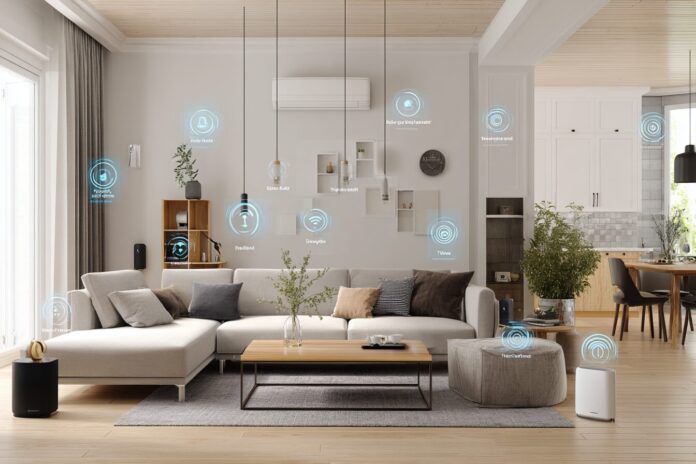Artificial intelligence is fast becoming the backbone of smart homes in 2025, turning the concept from a futuristic luxury into a standard of modern living. As AI technology advances, our living environments are evolving into responsive, intuitive spaces that adapt to our lifestyle needs. Most importantly, these intelligent systems are designed to predict our daily routines, adjust to our behaviors, and even learn from our interactions to make every moment at home more convenient. However, with all these promising enhancements, a critical question lingers in the background: Can we trust AI to carefully manage our most personal spaces?
Because our homes are becoming an integrated ecosystem of smart devices, each component must reliably communicate with others. Therefore, ensuring that every device not only functions flawlessly but also protects our privacy becomes essential. As detailed in various analyses, including insights from DigiCrusader, the technical intricacies behind these systems are as fascinating as they are complex.
The Promise of AI in Smart Homes
Today’s AI-powered smart homes are defined by their ability to learn from you. Because these systems analyze everything from your morning coffee schedule to your nighttime relaxation preferences, they create a tailor-made living experience. Most importantly, your daily routines inform the system, allowing it to adjust environmental factors like lighting and temperature. Moreover, advances in high-speed networking, especially with 5G, ensure that smart devices—ranging from thermostats to security cameras—communicate almost instantaneously.
Besides that, emotional intelligence in home assistants is taking the concept of smart technology to a new level. As noted by DigiCrusader, these devices are no longer just reactive but also empathetic, capable of recognizing and reacting to your mood changes. In this way, future homes won’t just be smart; they’ll be truly intuitive spaces that feel personally attuned to your needs.
Smarter Living: Comfort, Efficiency, and Security
Embracing AI in modern households translates directly into measurable advantages in comfort, efficiency, and security. For instance, customization is at the heart of this innovation; lights, media systems, and even grocery replenishments are adjusted to fit your specific habits. Moreover, as outlined by Intuz, dynamic scheduling and tailored responses make a noticeable difference in everyday convenience.
Because efficiency is equally important, smart devices are designed to reduce waste by detecting unoccupied rooms and adjusting energy use accordingly. Additionally, predictive maintenance features play a crucial role by anticipating and addressing issues before they escalate into costly repairs. On the security front, advanced systems employ facial recognition, anomaly detection, and even mimic real-world deterrents—like generating dog barks—to fend off intruders, as explained by sources such as CNET and Capmation. These innovations are not only enhancing safety measures but also ensuring that homeowners see a direct impact on utility bills.
The Catch: Should We Trust AI with Our Homes?
Despite the undeniable benefits, trust and privacy issues are major considerations in AI-driven smart homes. Because these systems continually collect and analyze personal data, the security of that data becomes paramount. Most importantly, homeowners must be aware of potential vulnerabilities that could allow hackers to gain unauthorized access. As observed by Bill Gates, the risks of AI misuse are real but manageable if stringent security protocols are in place.
Furthermore, while AI can detect and deter security breaches at a rapid pace, these same technologies can also be exploited by skilled cybercriminals to launch sophisticated attacks. Therefore, continuous monitoring, regular software updates, and advanced encryption are essential measures to safeguard smart home systems. Besides that, an ongoing dialogue between experts, consumers, and policymakers will significantly contribute to creating a secure digital environment at home.
Building Trust in the AI Home Revolution
To truly harness the potential of AI-powered homes, trust must be built on strong foundations of ethical design, transparency, and robust security measures. Most importantly, manufacturers are encouraged to adopt clear privacy policies and empower users with control over data sharing and device permissions. Because a transparent communication strategy helps demystify how these systems operate, it also builds consumer confidence.
Additionally, open collaboration among device makers, government regulators, and end users is critical. For example, setting clear guidelines for regular security patches and updates ensures that systems stay ahead of potential threats. As highlighted in resources from Capmation and Intuz, transparent practices and ethical AI development are keys to unlocking the full benefits of smart home technology while maintaining privacy and security.
The Future: Smarter, Safer, and More Personal
The horizon of smart home technology promises a future marked by comprehensive, personalized comfort and functionality. Because our living spaces will continue to evolve, future homes are expected to feature not only intelligent energy management and self-maintenance but also emotionally responsive systems that cater to personal moods and preferences. As detailed in forward-looking articles from sources like DigiCrusader, the synergy between human intuition and machine efficiency will be the cornerstone of next-generation living.
Similarly, advanced integration of AI into daily home operations will promote a safer environment by reducing both human error and the potential for cyber threats. Most importantly, as this transformative technology continues to mature, the ongoing commitment to ethical practices and open standards remains crucial. Future innovations will not only deliver a more personalized living experience, but they will also reinforce the value of trust between technology providers and homeowners. Therefore, the success of smart homes will be determined by the resilience and reliability of the relationship built between humans and machines.
References:
DigiCrusader, Intuz, CNET, Capmation, GatesNotes



